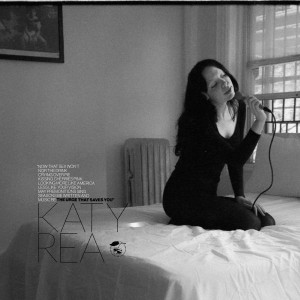
Artist
IMAGES: To download, click above. Image one by Erica Snyder. Image two and three by Joshua Chang.
Katy Rea
Katy Rea’s debut album, The Urge That Saves You was recorded entirely live. The empath rock, hook-filled record provides plenty to cling to all while splitting off into cinematic, dark psychedelia. The seamless shifts transpire masterfully, a unique mark of Rea’s talents. Her lead vocal is intense, melodic, and endlessly dynamic. This coupled with the touching restraint of the talented musicians joining her who’ve played with the likes of Angel Olsen, Fleet Foxes, Widowspeak, and more makes for a timeless collection of what Rea calls “premonitions, prayers, and warnings.”
Twelve years ago, Katy Rea left Texas for the promise of New York. It seemed everything was happening there, and it was. She auditioned for several television parts and stage plays, occasionally earning a role in someone else’s story, basking momentarily in the flickering glow of rare, unsteady success. Yet, songwriting was her true love and solace, the only way she could reliably self-soothe. For years, she floated around the city as if in a daze and found herself drawn to those who couldn’t love well. After late-night bar shifts, she’d come home to the New York night to write and strum along to the voices and sirens outside, often lulling herself to sleep.
One day during a rehearsal, Rea’s drummer and friend, Joshua Jaeger (Angel Olsen, Fleet Foxes, Jess Williamson) audibly observed that she’d be happier without her habits, but warned that it would take courage to overcome them. She knew in her heart he’d been right, so two weeks before recording The Urge That Saves You, Rea quit drinking.
The record’s tracks reflect her life’s journey, but it isn’t always obvious. Rea prefers to use characters and metaphors to tell her stories. Take Jessica in “Floods of Houston” who breaks a glass bottle and charges at cowboys beating up a boy in pink. The inspiration for this track comes from Rea’s own attempts to understand a woman’s rage through the stories of her mother as a teenager in Houston. As Rea put it in an interview, “When it rains, it pours. The creeping feeling of humidity in Houston lends to this feeling which I carry in myself.” The drums, played by Jaeger, are meant to highlight such creeping tension.
In “Lord Try,” Rea splits the track with a masochistic moment of prayer, begging god to give her more than she can handle. The trumpets played by Lessie Vonner (Beyonce, Jon Batiste) and Rea’s background vocals catapult this track into a unique, haunted place. Lead guitarist Andrew Forman (Onyx Collective) captures the sounds of the past returning with its regrets, dark memories, and old selves.
The final track and lead single, “We Come Back,” brings the album home with an acceptance of past selves and a promise to ultimately come back as someone new to love. The vocals rise to a point of exaltation, the background brimming with what sounds like the leaving of ghosts. The drums end on a point of triumph with Rea’s voice wise with the tone of having made peace. “We Come Back, is the heart of the album. I learned that it isn’t boring to be kind to yourself – it opens your world. It takes a lot of forgiveness to gain self-respect.”
Once ready, Rea and her band recorded the whole record live out of Figure 8 Studios by Prospect Park in Brooklyn, including the main vocals, all in one go. She wanted to do the best job that she could, so she and her bandmates gave it everything they had. And it shows. It was during recording The Urge That Saves You that Rea realized, for the first time with 100% certainty, that making music is exactly what she should be doing. Finally, there were no more doubts.
During quarantine, Rea took it upon herself to learn how to engineer and mix after an inspiring phone call with musician and producer Sam Evian, who urged her to make the work her own in every way that she could. Thereafter, Rea spent countless hours at Phil Weinrobe’s Rivington 66 in the Lower East Side overdubbing and mixing. Learning to mix wasn’t without difficulty. At times, Rea felt like she was learning a different language. Luckily, she had Spencer Murphy (Nick Hakim, Bartees Strange) Andrew Forman, and other talented engineers around to answer any questions and help along the way. The process of post-production was just as rewarding as the recording itself—Rea succeeded in making the album sound exactly how she wanted it to while also proving to herself that she was capable of taking the reins.
It is with well-earned pride that she celebrates the completion of this record. Moving forward, she is inspired to continue engineering and producing future albums on her own. In ways, The Urge That Saves You sounds to Rea like a Katy who was meeting herself for the first time.




